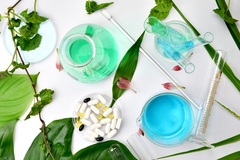Cosmetic industry faces shifts with new EU, UK and Shanghai regulations

08 Apr 2024 --- Recent regulatory updates in the EU, UK and Shanghai, China, are reshaping the global cosmetics industry. New restrictions on cosmetic ingredients and advertising guidelines are set to impact market dynamics.
This month, the EU Commission (EC) amended the EU Cosmetic Products Regulation Annexes with nine cosmetic ingredients published in the Official Journal of the EU.
The regulation pertains to UV filter 4-methylbenzylidene camphor, genistein, daidzein, kojic acid, retinol/retinyl acetate/retinyl palmitate, alpha-arbutin, arbutin, triclosan and triclocarban.
According to the EC, products containing 4-methylbenzylidene camphor are restricted from being placed on the market starting May 2025. Products with this ingredient will not be available next year May.

Retinol, retinyl acetate and retinyl palmitate are restricted to 0.05% in body lotions and 0.3% in other leave-on and rinse-off products. Products that exceed the restriction levels will not be placed on the market from November 2025, and from May 2027, the products “shall not be made available.”
Meanwhile, genistein is limited to 0.007%, daidzein to 0.02%, kojic acid to 1% in face and hand products, alpha-arbutin to 2% in face creams and 0.5% in body lotions and arbutin to 7% in face creams. Triclocarban is restricted to 0.2% in all cosmetics except mouthwash and triclosan to 0.3% in certain cosmetics.
 U restricts retinol, retinyl acetate and retinyl palmitate to 0.05% in body lotions and 0.3% in other leave-on and rinse-off products.The EC allows products that don’t adhere to these restrictions to be placed on the market until the end of the year if they meet the conditions applicable on April 23. They could be there until the end of October next year if they were placed on the market before the date.
U restricts retinol, retinyl acetate and retinyl palmitate to 0.05% in body lotions and 0.3% in other leave-on and rinse-off products.The EC allows products that don’t adhere to these restrictions to be placed on the market until the end of the year if they meet the conditions applicable on April 23. They could be there until the end of October next year if they were placed on the market before the date.
UK’s BHT update
The Office for Product Safety and Standards recently updated Annex III of the UK Cosmetics Regulation in the UK.
It restricts butylated hydroxytoluene (BHT) use in toothpaste to 0.1% and 0.001% in mouthwash and leave-on oral care products. Other leave-on and rinse-off products are limited to 0.8%.
BHT-containing products placed on the market before February 24, 2025, can be made available until June 24, 2025, outlines the restriction.
The regulatory move comes after the government agency’s Scientific Advisory Group On Chemical Safety Of Non-Food And Non-Medicinal Consumer Products issued a final opinion on BHT in cosmetics last November.
Shanghai advertising guidelines
China’s Shanghai Administration for Market Regulation and the Shanghai Medical Products Administration released the “Shanghai Cosmetics Industry Advertising Compliance Guidelines.”
The guidelines aim to standardize advertising in the cosmetics industry in Shanghai, ensuring compliance with national laws and regulations to protect consumers’ rights and promote industry health.
They cover aspects like product qualifications, advertising content and target audience considerations, emphasizing legal and truthful advertising practices to avoid misleading consumers or making false claims.
The guidelines also emphasize the importance of industry associations in promoting science and self-control to help consumers make educated decisions. The importance of ethical advertising practices in the cosmetics industry is underscored by the legal penalties for violating these guidelines.
By Venya Patel












